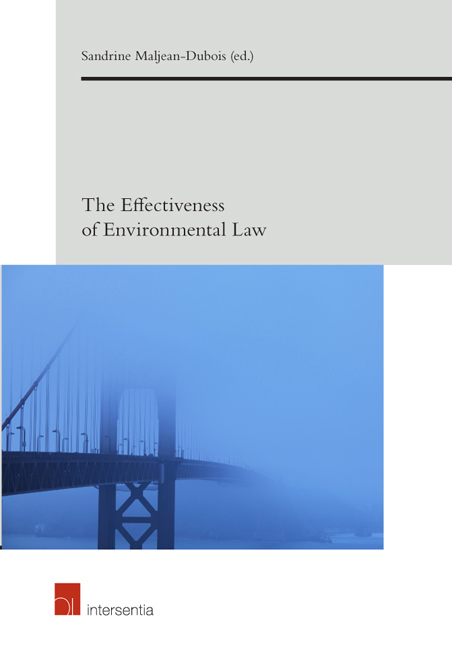Book contents
- Frontmatter
- Preface
- Contents
- Introduction. The Effectiveness of Environmental Law: A Key Topic
- Part 1 Measuring and Assessing Effectiveness
- Part 2 Improving Effectiveness
- Better Legislation
- Chapter 2 The Effectiveness of Payment for Ecosystem Services: a mix between a gradient model of public intervention and an effective normative framework
- Chapter 3 The Effectiveness of Environmental Law through Contracts
- Chapter 4 Legal Weaknesses and Windows of Opportunity in Transnational Biodiversity Protection: as Seen through the Lens of an Ecosystem Approach-Based Paradigm
- Chapter 5 Better Expertise through Institutional Linkages. The Case of the Mediterranean Basin
- Chapter 6 Environmental Dignity Rights
- Chapter 7 The Environmental Protection of Traditional Knowledge and the Active Participation of Indigenous Peoples in the Planning, Management and Decision-Making Processes as Means of Improving the Effectiveness of Environmental Law
- Chapter 8 Promoting Electricity from Renewable Energy Sources in France. Is French Law Appropriate for Achieving the Objectives?
- Chapter 9 Changing Patterns of International Environmental Law-Making: Addressing Normative Ineffectiveness
- Chapter 10 The Effectiveness of EU Nature Legislation: a long battle to secure supporting sectoral policies
- Better Implementation
Chapter 9 - Changing Patterns of International Environmental Law-Making: Addressing Normative Ineffectiveness
from Better Legislation
Published online by Cambridge University Press: 27 September 2018
- Frontmatter
- Preface
- Contents
- Introduction. The Effectiveness of Environmental Law: A Key Topic
- Part 1 Measuring and Assessing Effectiveness
- Part 2 Improving Effectiveness
- Better Legislation
- Chapter 2 The Effectiveness of Payment for Ecosystem Services: a mix between a gradient model of public intervention and an effective normative framework
- Chapter 3 The Effectiveness of Environmental Law through Contracts
- Chapter 4 Legal Weaknesses and Windows of Opportunity in Transnational Biodiversity Protection: as Seen through the Lens of an Ecosystem Approach-Based Paradigm
- Chapter 5 Better Expertise through Institutional Linkages. The Case of the Mediterranean Basin
- Chapter 6 Environmental Dignity Rights
- Chapter 7 The Environmental Protection of Traditional Knowledge and the Active Participation of Indigenous Peoples in the Planning, Management and Decision-Making Processes as Means of Improving the Effectiveness of Environmental Law
- Chapter 8 Promoting Electricity from Renewable Energy Sources in France. Is French Law Appropriate for Achieving the Objectives?
- Chapter 9 Changing Patterns of International Environmental Law-Making: Addressing Normative Ineffectiveness
- Chapter 10 The Effectiveness of EU Nature Legislation: a long battle to secure supporting sectoral policies
- Better Implementation
Summary
ABSTRACT
However we characterise normative “effectiveness”, international environmental law must be adaptable and capable of evolving to address new challenges and pursue ever-higher standards of environmental protection. Conventional regimes tend to be based on framework agreements, which institutionalise cooperation by establishing institutional machinery capable of elaborating more detailed environmental norms and standards. Older conventional instruments may also be understood in the light of current environmental standards and practices due to the “evolutionary interpretation” envisaged under the Vienna Convention. The almost universal participation of States in key global environmental treaties, as well as the pervasive influence of environmental norms on non-environmental treaty provisions, means that this “systemic integration” can promote more coherent and effective conventional regimes for environmental protection. In addition, a relatively relaxed approach is taken to recognition of the closely related customary rules, upon which environmental treaty rules tend to be based, due largely to the powerful law-making effect of a wealth of declarative instruments which rationalise the general principles of law relevant to environmental protection.
Quite apart from the traditionally recognised sources of international law, international environmental law relies heavily on atypical normative forms including, in particular, non-binding soft law instruments, which promote voluntary compliance, facilitate bilateral and multilateral environmental negotiations and provide a basis for the development of more specific binding norms. The rich infrastructure of intergovernmental-specialised agencies and programmes also plays a key role in providing the technical expertise required to achieve scientific consensus. International environmental law also tends to be procedurally sophisticated, requiring an open participative approach, especially where the environmental values concerned overlap with human rights requirements, thus ensuring that it can respond effectively to evolving societal expectations.
Finally, this field of international law is increasingly characterised by multilevel governance as well as by new forms of rules, standards and procedures emerging from non-traditional actors involved in the law-making process, suggesting a fluidity in the formation and evolution of international environmental rules, something which enhances their technical currency, broad legitimacy and applicability and, thus inevitably, their effectiveness.
INTRODUCTION
As a new body of rules which has emerged very rapidly in recent decades, the “effectiveness” of international environmental law has long been a matter of concern, causing commentators to focus on various aspects of normative design and implementation.
- Type
- Chapter
- Information
- The Effectiveness of Environmental Law , pp. 187 - 220Publisher: IntersentiaPrint publication year: 2017
- 1
- Cited by



